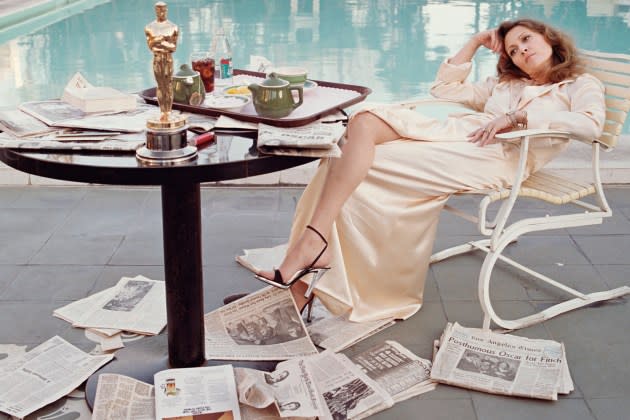‘Faye’ Review: The Legendary Dunaway Reveals All About Co-Stars, Lovers, Movies & Her Bipolar Disorder In Compelling HBO Documentary – Cannes Film Festival

Late in the highly entertaining and enlightening new HBO Documentary Films movie on the life and career of Faye Dunaway we learn how much this iconic star just loves coming to the Cannes Film Festival. “Just about every year,” she says — not only for the world’s best films but also to immerse herself in all aspects of filmmaking. I have seen her many times just soaking it all up cinematically both here in Cannes and Telluride, to name two fests.
So it seems appropriate that the Cannes Classics section would be the place for the World Premiere Wednesday night — in the presence of Dunaway as the French like to call it — of this terrific new docu in which Dunaway pretty much tells it all straight about her life, loves, desires, ambitions, movies, co-stars, depression, controversies, family and hopes for the future in a profession she says she can’t imagine not working in.
More from Deadline

Going into it I didn’t know what to expect, but what I got was a surprising, forthright and honest account of someone, as it is put in the film, who “started out as a normal person wanting to be famous, and ended up as a famous person wanting to be normal.” I didn’t get the part about her wanting to be “famous.” It is clear that what she really wanted was to act, and her initial ambitions didn’t include Hollywood but instead working under the guidance of Elia Kazan at Lincoln Center and then on Broadway before getting her first major movie break from multiple-Oscar-winning producer Sam Spiegel in the quirky ’60s romp The Happening, opposite Anthony Quinn. It brought her out of New York and right back to her home state of Florida, where it was shot. Bonnie & Clyde came along just two years later, cementing her immediately as a major film star and winning her first Oscar nomination.
Director Laurent Bouzereau is a veteran of various movie-oriented docs including a fine one on Natalie Wood and many chronicling films of Steven Spielberg, whose Amblin Productions is behind this one as well. He isn’t trying to rewrite the rules of this star biodoc form, nor is HBO, which has found recent success with films chronicling stars ranging from Mary Tyler Moore to Rock Hudson. What makes it so compelling is that it lets a very cooperative Dunaway tell her own story, soup to nuts, with the help of her son Liam O’Neill, who she and then-husband and world-renowned photographer Terry O’Neill adopted when he was less than a week old. As they sit together on the couch, he pulls one photo after another out of a scrapbook in order to entice Dunaway to comment on what each means to her at different points in her life. And what a life.
Born Dorothy Faye Dunaway, she grew up the daughter of an alcoholic (something she admits inheriting) in a family that also included a younger brother whom she adored. There are stories of her school days, trying to win beauty pageants and finally turning to drama in plays such as Harvey and Medea. But it is her remarkably sharp recall of the events of her life, career and especially films that make for some of the best stories.
On Bonnie & Clyde: Warren Beatty who also produced wasn’t sure about her casting but director Arthur Penn said he would walk if Dunaway wasn’t cast. Jane Fonda, Tuesday Weld and then-Beatty girlfriend Leslie Caron were early favorites.
On Chinatown: a strand of her very permed hairstyle for the film kept popping up and ruining takes until director Roman Polanski took matters into his own hands — literally — and tried to yank it off. That sent his star into a expletive-laden fit and straight to her trailer until she eventually agreed to come back and resume filming, and thanks to costume designer Anthea Sylbert with a hat placed squarely on her head.
On Network: Winning the Best Actress Oscar and then, at the suggestion of O’Neill, posing early the next morning at the Beverly Hills Hotel pool (see above), alone with her Oscar on the table and the newspapers headlining the wins strewn all around her as she lays out in silk role on the lounge chair. She says it is inspired by the song, “Is That All There Is?” This image is one of the very first we see in the docu and is considered one of the most iconic Hollywood shots ever.
On Mommie Dearest: Surviving the slings and arrows of critics for her vivid portrait of Joan Crawford and offering that she did what the script and director wanted, but when asked about regrets mentions doing that picture but then immediately defending the decision because of her admiration for Crawford. It is now a cult hit, one I have seen several times and it never gets old.
There is talk of her marriages to J. Geils Band rocker Peter Wolf, then to O’Neill and an affair with Marcello Mastroianni, even though he was married. She says he was probably the love of her life. There also is extensive talk of her diagnosed bipolar disorder and episodes of manic depression, the reason she believes as the cause of how “difficult” she could be on sets.
I walked into this film wondering if it was going to meet this issue head-on or just try and sugarcoat it. Well, Bouzereau gets to it almost right away, showing an infamous Tonight Show clip where Johnny Carson asks Bette Davis if there was any co-star she couldn’t stand. “Yes. Faye Dunaway,” Davis immediately answered. “And you can ask anyone else and they will tell you the same thing!” Dunaway doesn’t address her experience with Davis specifically (it was for a TV movie) but sends up that image of herself by showing how “difficult” she could be just sitting for this interview. Very amusing.
Author Mark Harris, Mickey Rourke (her co-star in Barfly), Barry Primus, directors James Gray and Jerry Schatzberg (with whom she had a romantic relationship), a very funny Hawk Koch and Sharon Stone are among those interviewed on camera about Dunaway, with the latter offering fascinating insights into what it is like to be someone in Dunaway’s position in Hollywood.
You will find yourself with renewed respect for this great star after watching this film on her life. If she was indeed difficult or “complicated,” as one interviewee put it, the end results are all up on screen — a true star who really thrived in the ’70s but could have just as easily in Hollywood’s earlier years, its Golden Age. I found myself wanting to watch many of her films all over again, even The Happening, which is best known today for the title song by Diana Ross and the Supremes. Dunaway said she had a blast making it. Good enough for me.
Time for a Faye retrospective, and this fine film is perfect reason to do it.
Title: Faye
Section: Cannes Classics
Distributor: HBO Documentary Films
Director: Laurent Bouzereau
Running Time: 1 hr, 31 min
Best of Deadline
Hollywood & Media Deaths In 2024: Photo Gallery & Obituaries
2024-25 Awards Season Calendar - Dates For Oscars, Tonys, Guilds, BAFTAs, Spirits & More
Sign up for Deadline's Newsletter. For the latest news, follow us on Facebook, Twitter, and Instagram.

 Yahoo News
Yahoo News 